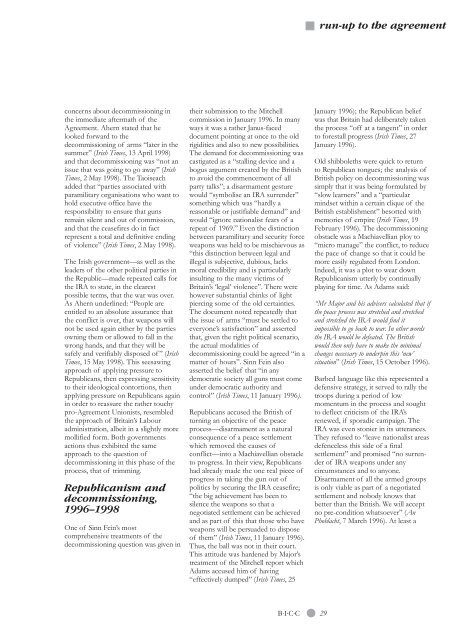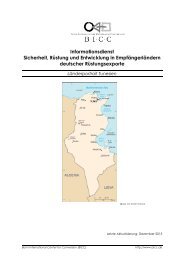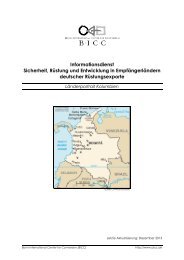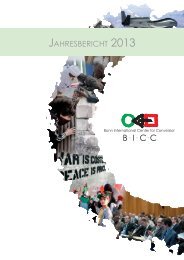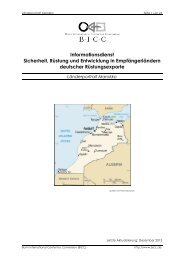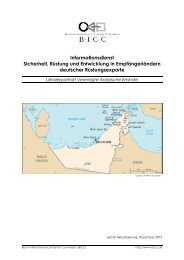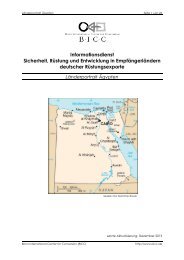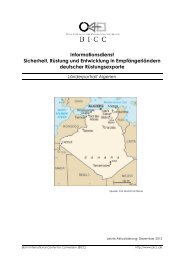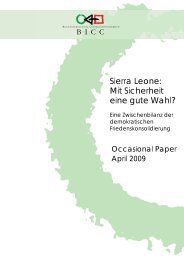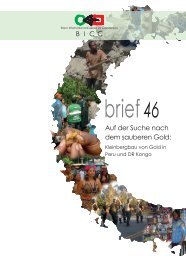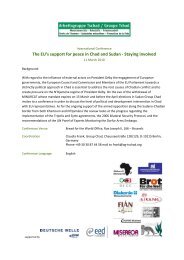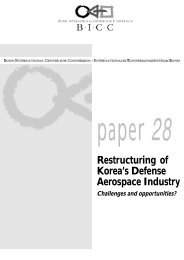English - BICC
English - BICC
English - BICC
Create successful ePaper yourself
Turn your PDF publications into a flip-book with our unique Google optimized e-Paper software.
concerns about decommissioning in<br />
the immediate aftermath of the<br />
Agreement. Ahern stated that he<br />
looked forward to the<br />
decommissioning of arms “later in the<br />
summer” (Irish Times, 13 April 1998)<br />
and that decommissioning was “not an<br />
issue that was going to go away” (Irish<br />
Times, 2 May 1998). The Taoiseach<br />
added that “parties associated with<br />
paramilitary organisations who want to<br />
hold executive office have the<br />
responsibility to ensure that guns<br />
remain silent and out of commission,<br />
and that the ceasefires do in fact<br />
represent a total and definitive ending<br />
of violence” (Irish Times, 2 May 1998).<br />
The Irish government—as well as the<br />
leaders of the other political parties in<br />
the Republic—made repeated calls for<br />
the IRA to state, in the clearest<br />
possible terms, that the war was over.<br />
As Ahern underlined: “People are<br />
entitled to an absolute assurance that<br />
the conflict is over, that weapons will<br />
not be used again either by the parties<br />
owning them or allowed to fall in the<br />
wrong hands, and that they will be<br />
safely and verifiably disposed of ” (Irish<br />
Times, 15 May 1998). This seesawing<br />
approach of applying pressure to<br />
Republicans, then expressing sensitivity<br />
to their ideological contortions, then<br />
applying pressure on Republicans again<br />
in order to reassure the rather touchy<br />
pro-Agreement Unionists, resembled<br />
the approach of Britain’s Labour<br />
administration, albeit in a slightly more<br />
mollified form. Both governments<br />
actions thus exhibited the same<br />
approach to the question of<br />
decommissioning in this phase of the<br />
process, that of trimming.<br />
Republicanism and<br />
decommissioning,<br />
1996–1998<br />
One of Sinn Fein’s most<br />
comprehensive treatments of the<br />
decommissioning question was given in<br />
their submission to the Mitchell<br />
commission in January 1996. In many<br />
ways it was a rather Janus-faced<br />
document pointing at once to the old<br />
rigidities and also to new possibilities.<br />
The demand for decommissioning was<br />
castigated as a “stalling device and a<br />
bogus argument created by the British<br />
to avoid the commencement of all<br />
party talks”; a disarmament gesture<br />
would “symbolise an IRA surrender”<br />
something which was “hardly a<br />
reasonable or justifiable demand” and<br />
would “ignore nationalist fears of a<br />
repeat of 1969.” Even the distinction<br />
between paramilitary and security force<br />
weapons was held to be mischievous as<br />
“this distinction between legal and<br />
illegal is subjective, dubious, lacks<br />
moral credibility and is particularly<br />
insulting to the many victims of<br />
Britain’s ‘legal’ violence”. There were<br />
however substantial chinks of light<br />
piercing some of the old certainties.<br />
The document noted repeatedly that<br />
the issue of arms “must be settled to<br />
everyone’s satisfaction” and asserted<br />
that, given the right political scenario,<br />
the actual modalities of<br />
decommissioning could be agreed “in a<br />
matter of hours”. Sinn Fein also<br />
asserted the belief that “in any<br />
democratic society all guns must come<br />
under democratic authority and<br />
control” (Irish Times, 11 January 1996).<br />
Republicans accused the British of<br />
turning an objective of the peace<br />
process—disarmament as a natural<br />
consequence of a peace settlement<br />
which removed the causes of<br />
conflict—into a Machiavellian obstacle<br />
to progress. In their view, Republicans<br />
had already made the one real piece of<br />
progress in taking the gun out of<br />
politics by securing the IRA ceasefire;<br />
“the big achievement has been to<br />
silence the weapons so that a<br />
negotiated settlement can be achieved<br />
and as part of this that those who have<br />
weapons will be persuaded to dispose<br />
of them” (Irish Times, 11 January 1996).<br />
Thus, the ball was not in their court.<br />
This attitude was hardened by Major’s<br />
treatment of the Mitchell report which<br />
Adams accused him of having<br />
“effectively dumped” (Irish Times, 25<br />
B·I·C·C<br />
run-up to the agreement<br />
January 1996); the Republican belief<br />
was that Britain had deliberately taken<br />
the process “off at a tangent” in order<br />
to forestall progress (Irish Times, 27<br />
January 1996).<br />
Old shibboleths were quick to return<br />
to Republican tongues; the analysis of<br />
British policy on decommissioning was<br />
simply that it was being formulated by<br />
“slow learners” and a “particular<br />
mindset within a certain clique of the<br />
British establishment” besotted with<br />
memories of empire (Irish Times, 19<br />
February 1996). The decommissioning<br />
obstacle was a Machiavellian ploy to<br />
“micro manage” the conflict, to reduce<br />
the pace of change so that it could be<br />
more easily regulated from London.<br />
Indeed, it was a plot to wear down<br />
Republicanism utterly by continually<br />
playing for time. As Adams said:<br />
“Mr Major and his advisers calculated that if<br />
the peace process was stretched and stretched<br />
and stretched the IRA would find it<br />
impossible to go back to war. In other words<br />
the IRA would be defeated. The British<br />
would then only have to make the minimal<br />
changes necessary to underpin this ‘new’<br />
situation” (Irish Times, 15 October 1996).<br />
Barbed language like this represented a<br />
defensive strategy, it served to rally the<br />
troops during a period of low<br />
momentum in the process and sought<br />
to deflect criticism of the IRA’s<br />
renewed, if sporadic campaign. The<br />
IRA was even stonier in its utterances.<br />
They refused to “leave nationalist areas<br />
defenceless this side of a final<br />
settlement” and promised “no surrender<br />
of IRA weapons under any<br />
circumstances and to anyone.<br />
Disarmament of all the armed groups<br />
is only viable as part of a negotiated<br />
settlement and nobody knows that<br />
better than the British. We will accept<br />
no pre-condition whatsoever” (An<br />
Phoblacht, 7 March 1996). At least a<br />
29


